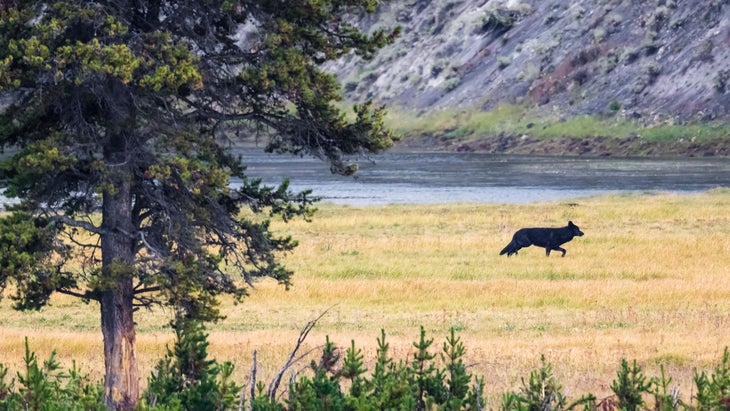Products You May Like
Get access to everything we publish when you
sign up for Outside+.
Hunters killed 20 resident Yellowstone wolves this season after the animals roamed outside of Yellowstone’s boundaries, eliminating an entire pack and leading the park’s top official to call on Montana to suspend its season, the National Park Service says.
In a statement to the Associated Press, park officials said the vast majority of the wolves, 15 in total, died in Montana, with another five falling to hunters in Wyoming and Idaho. The losses include the entire Phantom Lake pack, which the park told the AP it now considered “eliminated.”
The deaths represent an estimated 17 percent of Yellowstone’s wolves, leaving less than 100 of the animals roaming the park, and are the highest number killed in a single season since the federal government reintroduced the animals to Yellowstone 25 years ago. They may not be the last park wolves of the season to fall to hunters in Montana: This year’s season runs through mid-March. This year, Montana hunters and trappers are also operating under relaxed regulations after the state allowed hunters to lure wolves with bait and trappers to use snares as well as leghold traps. Crucially, the state also lifted longstanding quotas in two hunting districts bordering the park, which had generally limited hunters and trappers to killing just one wolf total in each.
After hunters killed three wolves from the park’s Junction Butte pack in September, Yellowstone Superintendent Cam Sholly took the unusual step of expressing concerns about the state’s wolf policies in a public statement, noting that 33 percent of the park’s boundary with Montana was within 1 mile of private land where trapping would be allowed under the newly relaxed rules.
“These wolves are part of our balanced ecosystem here and represent one of the special parts of the park that draw visitors from around the globe,” Sholly said. “We will continue to work with the state of Montana to make the case for reinstating quotas that would protect the core wolf population in Yellowstone as well as Montana’s direct economic interests derived from the hundreds of millions spent by park visitors each year.” In a December 16 letter to Montana Governor Greg Gianforte that the AP obtained under a Freedom of Information Act request, Sholly asked the governor to shut down hunting and trapping in areas adjacent to the park, noting that hunters had already killed “an extraordinary number of Yellowstone wolves” that season.

In a written response to Sholly on Wednesday, Gianforte noted that hunting and trapping of wolves is legal under state law once the animals have left the park’s borders, and he touted rules that allow Montana’s wildlife commission to consider ending or modifying the season if hunters take more than a certain number of animals.
The news has led to renewed calls from conservation organizations for the federal government to reinstate protections for gray wolves across the northern Rockies. In a post on its Facebook page, Jamie Rappaport Clark, president and CEO of Defenders of Wildlife, wrote that the number of animals killed proved that “no gray wolf is safe in the Lower 48.”
“Unless we stop these deaths, the continued bloodshed will severely erode the long-term health of Yellowstone’s iconic wolves and severely undermine the decades of research so important to understanding wolves worldwide,” Clark wrote. “We call upon the USFWS to use their emergency authority to reinstate federal protections for wolves in the Northern Rockies and end this needless loss of life.”
In September, the U.S. Fish and Wildlife Service announced it intended to conduct a review to determine whether wolves in the northern Rockies and western U.S. should receive Endangered Species Act protections again. That review is ongoing.
